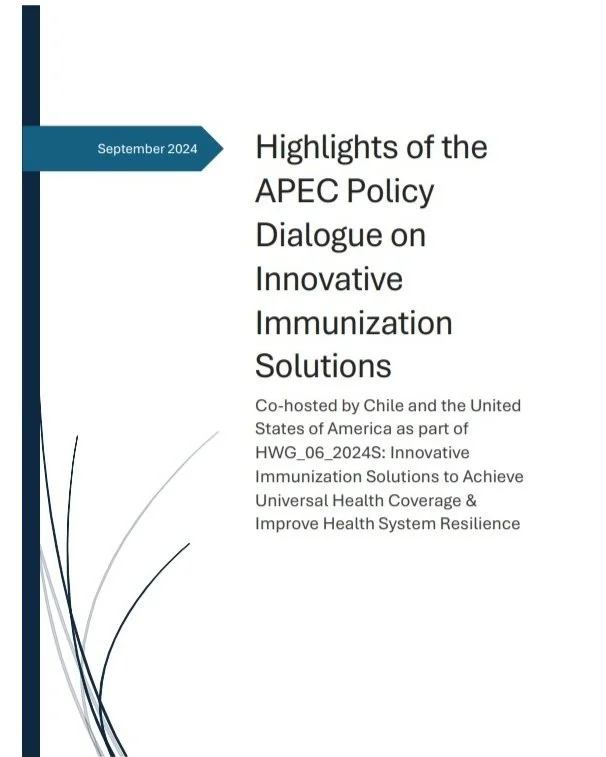Highlights of the APEC Policy Dialogue on Innovative Immunization Solutions
On 10 September 2024, Chile and the United States co-hosted a policy dialogue on “Innovative Immunization Solutions to Achieve Universal Health Coverage & Improve Health System Resilience” online and in-person. The dialogue is the first of two hybrid meetings to be held as part of the Asia-Pacific Economic Cooperation (APEC) Health Working Group (HWG) project HWG_06_2024S.
The dialogue was moderated by Access Partnership and featured speakers from Universidad del Desarrollo (Chile), SUNY Upstate Medical University (United States), U.S. Centers for Disease Control and Prevention (United States), and the Región de Murcia’s Prevention and Health Protection Service (Spain).
The global health community is continually exploring innovative solutions to combat the burden of infectious diseases, particularly for vulnerable populations such as infants. Prophylactic monoclonal antibodies (mAbs) have emerged as a promising new class of immunization tools, offering passive immunity to individuals at risk of severe disease, such as respiratory syncytial virus (RSV) in infants. The recent introduction and successful implementation of nirsevimab, a mAb used to prevent RSV-related hospitalizations, offers valuable insights into the broader application of this technology. Experiences from Chile, the United States, and Spain provide a compelling case study on the viability and effectiveness of mAbs, highlighting their potential to enhance public health outcomes globally.
The following steps and recommendations were discussed during the dialogue to enhance the global awareness and viability of prophylactic mAbs:
Stakeholder Collaboration: Governments should ensure early involvement of all stakeholders, including scientific communities, healthcare providers, and the public, in decision-making processes. Platforms like APEC offer valuable opportunities for economies to showcase their experiences and learn from one another.
Flexible Policy Frameworks: Immunization programs must be adaptable, incorporating both traditional vaccines and mAbs to meet the diverse needs of different populations.
Public Education and Engagement: Effective communication strategies are critical to build public trust in new immunization tools, especially when awareness of the underlying disease is low.
Economic Considerations: Governments should conduct holistic cost-effectiveness analyses that measure beyond traditional inputs by considering the full value of immunization to ensure the long-term sustainability of incorporating mAbs into immunization programs
The APEC Policy Dialogue underscored the pivotal role of innovative immunization solutions in achieving universal health coverage and strengthening health system resilience. The combined experiences of Chile, the U.S., and Spain provide a blueprint for scaling the use of mAbs as part of routine immunization strategies. These case studies demonstrate that mAbs are not only effective in reducing disease burden but also viable from an economic and public health perspective when supported by the right infrastructure, policy frameworks, and public engagement strategies.
Disclaimer: This project is a self-funded initiative by the proposing APEC economy, Chile, with the support of co-sponsoring economies. APEC does not provide funding for this project and will not be responsible for any financial, legal, or other liabilities that may arise in relation to this project, including but not limited to those concerning the use, distribution, or administration of vaccines or prophylactic treatments discussed or promoted within the scope of this project. The responsibility for the outcomes and impacts of this project lies solely with the proposing economy and its collaborators.
